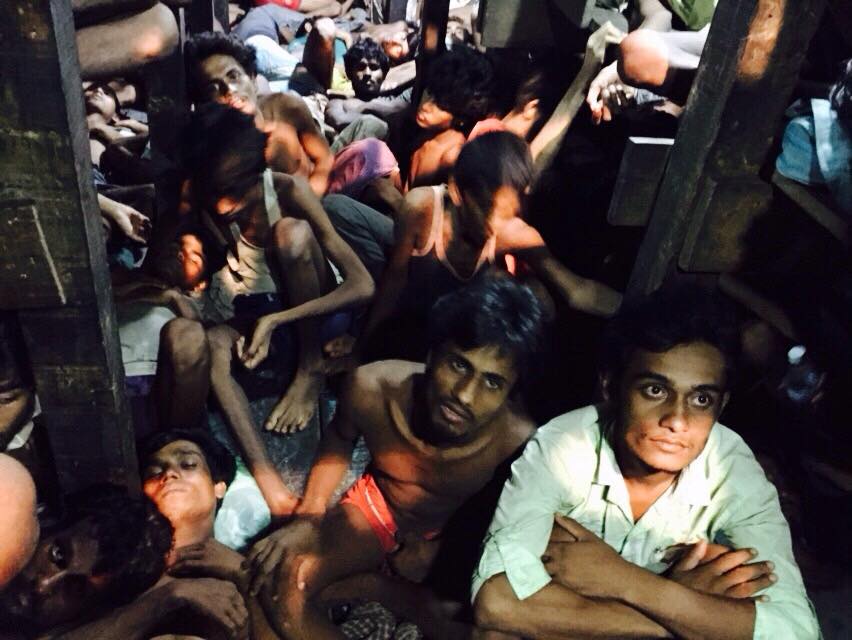Responding to the information from Indonesian Water and Air Police (Polairud) that boats carrying around 500 Rohingya refugees were sighted near Indonesian waters, Amnesty International Indonesia and Risalah Jakarta Forum said:
“We urge the Government of Indonesia not to refuse and push back boats carrying hundreds of people seeking safety,” said Usman Hamid, Executive Director of Amnesty International Indonesia.
“It is necessary for authorities in the country to allow all boats carrying refugees to safely disembark and avert a humanitarian crisis. We appreciate Indonesia’s past leadership when the authorities allowed Rohingya people to land in May 2015, this sort of effort should be continued,” Hamid added.
“On humanitarian grounds, it is only right to give assistance to Rohingya refugees displaced from their homes,” said Alissa Wahid, member of Risalah Jakarta Forum.
“People who have been on board overcrowded boats for months, unequipped with adequate marine navigation tools, are often found in conditions where they lack food or clean water, and are suffering from health problems,” she explained.
“These people belong to the category of “persons in distress” in international law, and thus the Government of Indonesia ought to rescue them,” she added.
“The Government of Indonesia must respect the international legal principle of non-refoulement, which prohibits countries from refusing or expelling people to a place where their lives or freedoms are at serious risk,” said Reverend Weinata Sairin, another member of Risalah Jakarta Forum.
“Therefore, we also urge the Government of Indonesia to revive solidarity in the region, not only to condemn the Myanmar authoritie oppression of the Rohingya, but also allow those whose lives are currently at risk at sea to disembark safely in Indonesia,” Haidar Bagir of Risalah Jakarta Forum declared.
“The Government must also uphold the established commitments based on regional declarations, including the 2016 Bali Declaration, which states that a comprehensive regional approach to tackle irregular migration – such as the case of Rohingya – will be pursued based on shared burden and collective responsibility,” he conveyed.
“Thus we urge the Government to encourage collaboration and cooperation in the search and rescue of Rohingya men, women and children,” said Bagir.
“Not only that, Governments in the region should also address the root causes of irregular migration by resolving citizenship issues and ensuring that refugees and migrants are able to use safe routes to move across borders and avoid dangerous travel by sea,” Wahid argued.
“We also call the Government of Indonesia to ensure that refugees are not criminalised, detained, or punished because of their method of arrival. In addition, it is expected that the Government of Indonesia also immediately coordinates with other countries in the region, especially those in ASEAN, to develop emergency mechanisms in response to people seeking refuge by the sea in the future,” Rev. Sairin continued.
“Most importantly, the COVID-19 pandemic situation should not dull our humanity as human beings. On the contrary, by applying proper and humane quarantine procedures, we can save the Rohingya from the epidemic itself and end their misery,” Usman ended.
Background
Since August 2017, more than 740,000 Rohingya people have escaped to Bangladesh from Myanmar after security forces led operations that amounted to war crimes and crimes against humanity in Rakhine State.
Based on information from the Indonesian Water and Air Police (Polairud) on Wednesday, 13 May 2020, boats carrying around 500 Rohingya refugees were sighted near Indonesian waters in the Aceh region.
Referring to Article 98 (2) of the United Nations Convention on the Law of the Sea (UNCLOS), coastal states, such as Indonesia, must carry out adequate and effective search and rescue (SAR) operations relating to safety in and on the sea.
Similar obligations for coastal states are also stated in Article 2.1.10 of the International Convention on Maritime Search and Rescue, which mandates the conduct of search and rescue operations for any survivors of distress in the waters of the SAR area of the country concerned, regardless of the nationality, status, or conditions in which the persons are found.
The International Aeronautical and Maritime Search and Rescue Manual by the International Maritime Organization (IMO), states that once persons in distress are rescued, they must be immediately taken to a “place of safety.” This place of safety refers to a place where the lives of the person in distress are not threatened in terms of their safety or health.
In urgent situations, a person in distress has the right to be granted the right to temporary disembarkation by the Government responsible for the SAR area where persons in distress are found.
Moreover, Indonesia and other ASEAN member states are bound by the Charter of the Association of Southeast Asian Nations (ASEAN Charter), particularly Article 1, which includes the duty to promote and protect human rights and fundamental freedoms.
FORUM RISALAH JAKARTA
- Usman Hamid
- Haidar Bagir
- Weinata Sairin
- Franz Magnis Suseno
- Bhikku Jayamedho
- Lukman Hakim Saifuddin
- KH D. Zawawi Imron
- Taufik Abdullah
- KH. Agus Sunyoto
- John A Titaley
- Romo Mudji Sutrisno
- MPU Suhadi Sendjaja
- Pdt. Henriette T. Lebang
- Yudi Latif
- N. Udayana S.
- Uung Sendana Linggaraja
- KH M. Jadul Maula
- Acep Zamzam Noor
- Zastrow Al Ngatawi
- Lies Marcoes
- Fatin Hamama
- Inaya Wahid
- A Suaedy
- A Rumadi
- Arie Kriting
- Agus Noor
- Kalis Mardiasih
- Alissa Wahid
- M. Syafi Alielha
- Garin Nugroho
- Adung Abdul Rochman
- Hadi Rahman
- Helmi Hidayat
- Wahyu Muryadi
- A. Romzy
- Ulil Abshar Abdalla
- Anggia Ermarini
- Sunanto

